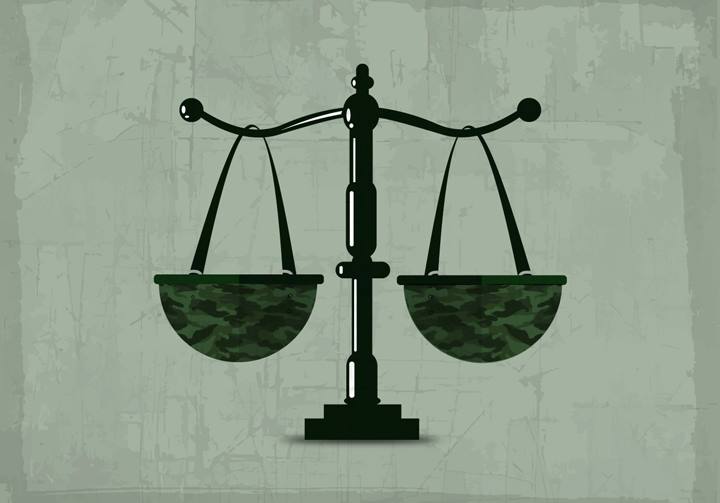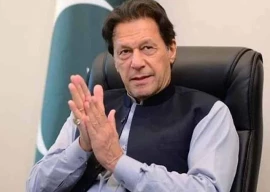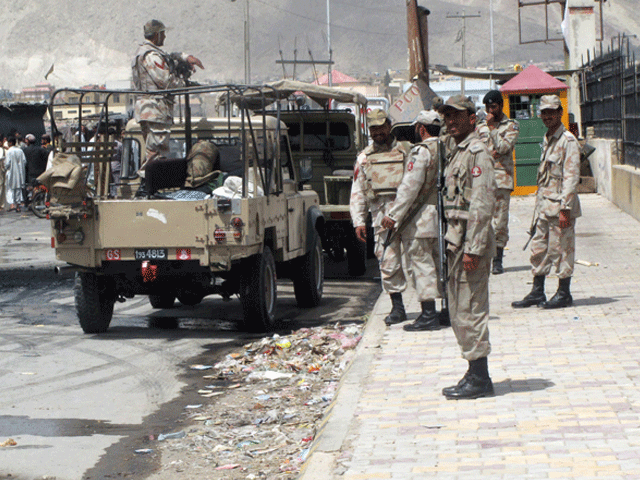
Convened to accost the main opposition party, the PPP, which had boycotted two previous meetings of parliamentary leaders, the two sides came up with contradictory statements after the huddle, with the PPP announcing that it would be tabling a separate bill on the issue.
Finance Minister Ishaq Dar, who represented the government side, purportedly claimed that the PPP had conceded its support to reinstating the military courts, saying it would now support a two-year reinstatement.
On its part, the government agreed to inculcate the provisions of the Qanoon-i-Shahadat-1984 (Law of Evidence) in the draft as proposed by the PPP. His statement, reported by various media outlets, was immediately contradicted by the PPP.
“[The] Pakistan Peoples Party has not agreed to the draft legislative proposals prepared by the government for the revival of military courts,” the party’s spokesperson Senator Farhatullah Babar said in a statement issued after the meeting.
“Media reports about the PPP having agreed to the draft legislation are not correct and are contradicted. The PPP totally and roundly rejects any statement purportedly issued by any official agency creating a false and erroneous impression of the PPP having agreed to the draft proposals of the government.”
Senator Babar told The Express Tribune that the PPP would now table its own bill, parallel to the government’s draft in parliament and would seek support of other like-minded parties to its version.
On February 28, political parties, including the PTI, had given their consent to the government draft of constitutional amendment and the subsequent legislation needed to re-establish military courts for another two years.
Military courts were set up in January 2015 for a period of two years to try hardcore terrorists after the barbaric attack on the Army Public School in which more than 150 people – mostly children – were killed.
The term of these courts were expired on January 7. The government initially proposed their re-establishment for three years, but finally agreed for a two-year term.
It needs an amendment in the Constitution that requires the support of two-thirds members of both the houses of parliament separately and a subsequent legislation to amend the Army Act.
The government is likely to table both the bills in parliament today (Friday) or next week.
Initially, the PPP objected to a proposed clause of the new draft of constitutional amendment from which the words ‘religion’ and ‘sect’ used in 21st Amendment were omitted and a generalised term of ‘terrorism’ has been used.
Human rights groups criticise the military courts, saying they do not meet the requisite standards of fair trial.
The PPP claimed that the government did so to appease religious parties like the JUI-F and the JI. It announced an all parties’ conference (APC) to convince other parties to its stance.
Before the proposed March 4 APC of the PPP, the government succeeded in cobbling support of all other parties to its draft on February 28.
The PPP, left alone on the issue, changed its APC into a multi-party conference and included other contentious issues on the agenda.
The government was not invited to the moot, while the two main opposition parties – the PTI and the MQM -- stayed away from the March 4 multi-party conference.
The PPP on March 7 announced its nine proposals and offered the government dialogue. The government sent those proposals to other parties before Thursday’s huddle.
“We offered the government our support. All we wanted was some minimum standards to ensure fair trail,” Senator Babar said.
The PPP senator claimed that the government was not ready to consider the PPP’s proposals that compelled his party to draft its own bill and table it in parliament.
He was not sure when the PPP’s bill would be ready and presented in parliament.
Published in The Express Tribune, March 10th, 2017.

1722586547-0/Untitled-design-(73)1722586547-0-165x106.webp)


1732326457-0/prime-(1)1732326457-0-165x106.webp)





1724249382-0/Untitled-(640-x-480-px)1724249382-0-270x192.webp)






COMMENTS
Comments are moderated and generally will be posted if they are on-topic and not abusive.
For more information, please see our Comments FAQ